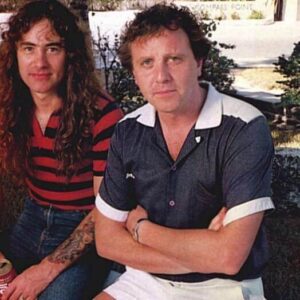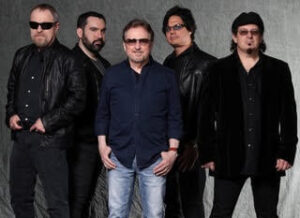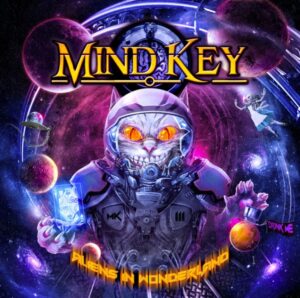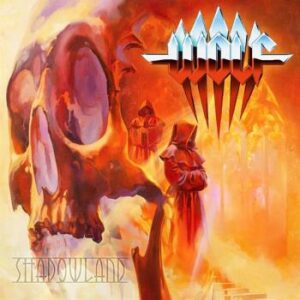Legendary producer Martin Birch (1948-2020) remembered

Martin Birch with Rainbow’s Ronnie James Dio (Black Sabbath) and Richie Blackmore (Deep Purple)
Martin Birch retired from the world of music in 1992, after producing “Fear of the Dark”. It was the last of ten albums that he produced for Iron Maiden, having begun working with them in 1981. Birch also appeared in the music video for “Holy Smoke” two years before his retirement.
Martin Birch sadly died of undisclosed causes on August 9th, 2020, aged 71.
Birch was born on December 27th, 1948 in Woking, Surrey, England. Having failed to become a recording artist as a singing guitarist in the British blues band Mother’s Ruin, Birch started out working with The Jeff Beck Group (1969) and Peter Green-era Fleetwood Mac (1969-73, also engineering Green’s 1970 solo debut) before being recruited by Deep Purple to engineer and later co-produce the string of landmark albums they recorded between 1969 and 1975.

David Coverdale (Deep Purple, Whitesnake) with Martin Birch.
Birch joined Purple for their first album with Ian Gillan (“Concerto for Group and Orchestra”) and stayed with them until their final album with David Coverdale, credited with the nickname “The Wasp” on “Come Taste The Band”. Following his death, David Coverdale commented as follows: “It is with a very heavy heart I’ve just had verified my very dear friend & producer Martin Birch has passed away…Martin was a huge part of my life…helping me from the first time we met through until Slide It In…Mt thoughts & prayers to his family, friends & fans…”

Ritchie Blackmore (Deep Purple, Rainbow) recording with Martin Birch.
The song “Hard Lovin’ Man” from “Deep Purple in Rock” was dedicated to him, “For Martin Birch – catalyst”. “Yes, we had a dynamic engineer in Martin Birch,” Ian Gillan said in 2005. “Musically, Martin didn’t have to do anything. He wasn’t a producer in that sense, but he was an engineer with a new way of thinking. He didn’t ‘close down’ the studio and baffle everything up and reduce it to zero and then rebuild it on the desk, which was the received knowledge at the time. What he did was listen to how a drum kit sounded in a room and then try and reproduce the sound. This was revolutionary thinking, believe it or not. He somehow got it sounding right. He recorded it loud, and to hell with the meters – they were going into the red all over the place.”
Martin Birch also worked with the various members of Deep Purple as they went their different ways. Birch worked on albums by Jon Lord (1971, 1976), Paice Ashton Lord (1977), Whitesnake (1978-84, also producing solo recordings by guitarist Bernie Marsden), Roger Glover (1978, also credited with backing vocals and playing guitar), and Richie Blackmore’s Rainbow (1975-78).
When Ronnie James Dio and Cozy Powell left Rainbow, Birch joined them for Powell’s solo debut (1978) and Dio’s first two albums with Black Sabbath (1980-81). “We felt that bringing someone in could really help focus the ideas,” Tony Iommi said in 2016. “It was Ronnie who’d recommended Martin, as they’d worked together in Rainbow. What he brought in was an extra dimension to the songs. And we also recorded very fast. The whole process went so smoothly. We’d been used to taking longer and longer to record, with things getting out of hand. But this time, it was a joy to be in the studio.”
https://youtu.be/W6CjO0H2j0s
In a 1983 interview with Best magazine, Birch explained why he preferred to work with the same artists over and over. “I certainly think that you can only make the most out of a band if you know it really well, very much in depth,” he said. “Occasional producers who make an album with a band, then move on to another, are bound to do something pretty shallow. The results are always brilliant, excellent at the time, but you realize later that the true colors of the band don’t come out and the album loses quickly its prestige.”
In addition, Birch worked on records by Terry Reid (1969), Wishbone Ash (1970-72), The Groundhogs (1970-72), Steamhammer (1970), Beggar’s Opera (1970-71), Gary Farr (1970), Junco Partners (1970), Skin Alley (1970), Judo (1970-71), Memphis Slim (1970), Stackridge (1971), Canned Heat and John Lee Hooker (1971), Stray (1971), Skid Row (1971), Toad (1971-72), Faces (1970-71), Silverhead (1972), Warm Dust (1972), Flash (1972), Richard Plant (1972-73), Richard Kerr (1973-74), Gary Moore (1973), Nina (1974), Leo Sayer (1974), Wayne County & the Electric Chairs (1977-78, credited as “Mervin Slime”), Mainland (1979), Blue Öyster Cult (1980-81), Michael Schenker Group (1982) and Rock Workshop (1970-71), Alex Harvey’s band before he teamed up with Tear Gas to form The Sensational Alex Harvey Band.
Martin Birch supposedly played guitar on the Bob Welch composition “Keep On Going” off 1973’s “Mystery to Me”, the final Fleetwood Mac album that Birch worked on. He also played rhythm guitar on the 1974 album “I Survived” by Adam Faith, a recording for which he was also the engineer.

Martin Birch with Iron Maiden’s Steve Harris.
Having heard Iron Maiden’s self-titled 1980 debut, it was supposedly Richie Blackmore who suggested that Martin Birch should start working with them. Birch went on to produce “Killers” (1981), “The Number of the Beast” (1982), “Piece of Mind” (1983), “Powerslave” (1984), “Somewhere in Time” (1986), “Seventh Son of a Seventh Son” (1988), “No Prayer for the Dying” (1990) and “Fear of the Dark” (1992) before leaving the world of music production.
“Martin was like a guru to me, and everyone in Maiden at the time,” Bruce Dickinson recalled regarding the time when he first joined the band. “The whole thing was just a lads’ night out. We had a bloody great time.” On each album he was credited with a different nickname: “Headmaster”, “Farmer”, “Marvin”, “Masa”, “Disappearing Armchair”, “The Bishop” and “The Juggler”.
https://youtu.be/J0N1yY937qg













